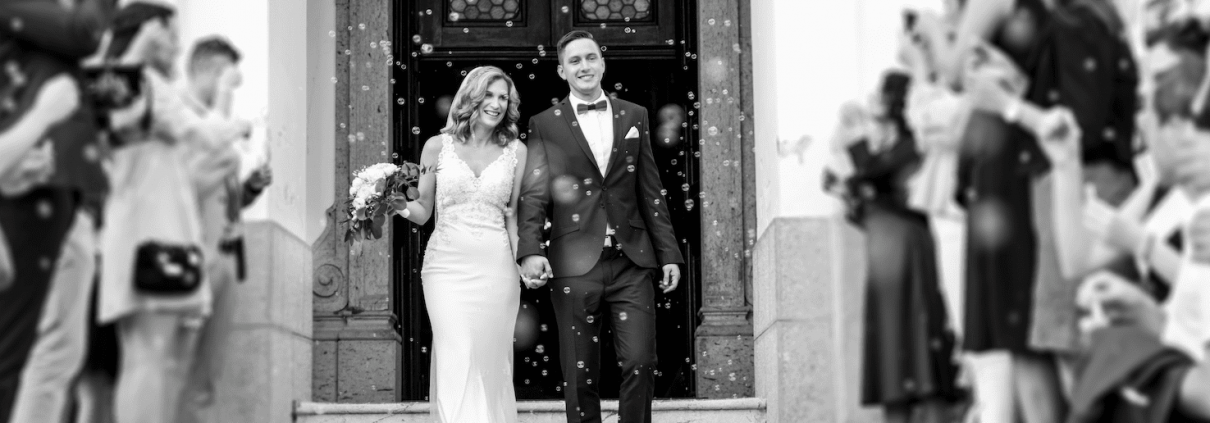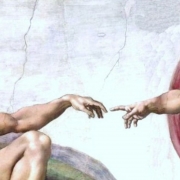A Psychological Interpretation of Genesis 2:24 by Dr. Emily Dowdell
“Therefore, a man leaves his father and his mother and cleaves to his wife, and they become one flesh.”
In Pope St. John Paul II’s Theology of the Body, he begins with Genesis. What better way to tell the story of what it means to be human then to start at the beginning. In the Creation account, it is revealed that man was not meant to be alone, and God created a suitable helper for him. The relationship between the man and the woman was designed to be one of mutuality and complementarity. There were significant differences, yet they existed in harmony and complemented one another.
One of the goals of Christian marriage is to rediscover that original unity between Adam and Eve, through sacrifice, self-gift, and a shared movement toward holiness. Yet often, couples find themselves feeling isolated and alone, experiencing solitude and even despair within their relationships. The idea of marital unity can seem so far off, like a distant dream, when the day-to-day interactions are grating. In Love & Responsibility, Pope St. John Paul II (Karol Wojtyla) wrote:
True love, a love that is internally complete, is one in which we choose the person for the sake of the person, — that in which a man chooses a woman or a woman chooses a man not just as a sexual partner but as the person on whom to bestow the gift of his or her own life. It is put to the test most severely when the sensual and emotional reactions themselves grow weaker, and sexual values as such lose their effect. Nothing then remains except the value of the person, and the inner truth about the love of those concerned comes to light. If their love is a true gift of self, so that they belong, each to the other, it will not only survive but grow stronger and sink deeper roots. Whereas if it was never more than a sort of synchronization of sensual and emotional experiences, it will lose its raison d’etre and the person involved will suddenly find themselves in a vacuum.
Ideally, when a man and woman enter a marital relationship, they are doing so freely and are able to make a full gift of themselves. Sometimes, however, this is not the case. As Pope St. John Paul II wrote in Theology of the Body, in order to give yourself, you must first have some sense of self-ownership.
Some psychologists like to focus on “the unconscious” in their work and believe that the goal of individual therapy is to bring the things that are outside the person’s awareness into view. These are the therapists that like to ask, “so, tell me about your mother…” There is a sense that if we can become more aware of our true intentions, motivations, and desires, we can make more informed decisions and increase ownership of our choices. To uncover the truth about ourselves, we go back to the beginning, to our origin stories.
When we carry unresolved pain from our past in our unconscious, we can react to our current relationships and life events from a place of fear and self-protection without even realizing it. There is a defense system in place to keep negative past experiences from recurring. It is a very natural process. As a kid, you touched the stove and found out that it burns, and you will never touch it again… In our interactions with our parents as children, we were constantly using them as a sounding board, taking in and adapting to their feedback, and learning how to be. Our parents were not perfect people and sometimes their reactions were not the most reliable. In such cases, we developed beliefs and reactions that may have helped us navigate childhood, but do not generalize well into adulthood. The journey of self-mastery involves untangling the past from the present, recognizing when we’re reacting based on our history instead of the here-and-now. In order to be fully present to the person in front of me, I need to see the reactions that are coming from my own unmet needs or history and make a conscious choice to reorient myself to the person before me. It is a brave and difficult thing to explore some of the dark corners of your story, but once illuminated the fear no longer reigns.
So what does all this have to do with Genesis 2:24? My working theory is that most marital conflict is rooted in an inability to see past an original wound and truly orient to the other person. Maybe I’m reacting to something my spouse said and interpreting it through a lens colored by my past experience. That coloration, while true to my experience, may affect my ability to see my spouse’s intentions clearly or interpret them accurately. I’ll give you a personal example. My dad was not around very much when I was young. That generated an assumption in my mind that men are naturally selfish. For a longtime, I had no idea that I even had that assumption, never mind that I was using it to interpret the behavior of all the men in my life. You can imagine how that filter might affect my interpretation, in moments when my husband would choose to do something for himself, instead of for our family. Thankfully, I’ve learned to identify when that thought-train is leaving the station and choose to reorient myself to my spouse – who by the way is incredibly devoted to family – and see that in the moments he’s choosing something for himself, it’s to replenish and rest, to make himself more available to us in the future. What a different reality! So, I like to think that to leave the father and mother and cleave to the spouse, can speak to that process of untangling the past from the present, ultimately restoring the freedom needed to fully commit to loving the person before me in the present moment.











